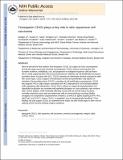| dc.contributor.author | Li, Qinglin | en_US |
| dc.contributor.author | Yang, Xiuwei H. | en_US |
| dc.contributor.author | Xu, Fenghui | en_US |
| dc.contributor.author | Sharma, Chandan | en_US |
| dc.contributor.author | Wang, Hong-Xing | en_US |
| dc.contributor.author | Knoblich, Konstantin | en_US |
| dc.contributor.author | Rabinovitz, Isaac | en_US |
| dc.contributor.author | Granter, Scott R. | en_US |
| dc.contributor.author | Hemler, Martin E. | en_US |
| dc.date.accessioned | 2014-03-10T20:34:07Z | |
| dc.date.issued | 2012 | en_US |
| dc.identifier.citation | Li, Qinglin, Xiuwei H. Yang, Fenghui Xu, Chandan Sharma, Hong-Xing Wang, Konstantin Knoblich, Isaac Rabinovitz, Scott R. Granter, and Martin E. Hemler. 2012. “Tetraspanin CD151 plays a key role in skin squamous cell carcinoma.” Oncogene 32 (14): 1772-1783. doi:10.1038/onc.2012.205. http://dx.doi.org/10.1038/onc.2012.205. | en |
| dc.identifier.issn | 0950-9232 | en |
| dc.identifier.uri | http://nrs.harvard.edu/urn-3:HUL.InstRepos:11878918 | |
| dc.description.abstract | Here we provide the first evidence that tetraspanin CD151 can support de novo carcinogenesis. During two-stage mouse skin chemical carcinogenesis, CD151 reduces tumor lag time and increases incidence, multiplicity, size, and progression to malignant squamous cell carcinoma (SCC), while supporting both cell survival during tumor initiation and cell proliferation during the promotion phase. In human skin SCC, CD151 expression is selectively elevated compared to other skin cancer types. CD151 support of keratinocyte survival and proliferation may depend on activation of transcription factor STAT3, a regulator of cell proliferation and apoptosis. CD151 also supports PKCα-α6β4 integrin association and PKC-dependent β4 S1424 phosphorylation, while regulating α6β4 distribution. CD151-PKCα effects on integrin β4 phosphorylation and subcellular localization are consistent with epithelial disruption to a less polarized, more invasive state. CD151 ablation, while minimally affecting normal cell and normal mouse functions, markedly sensitized mouse skin and epidermoid cells to chemicals/drugs including DMBA (mutagen) and camptothecin (topoisomerase inhibitor), as well as to agents targeting EGFR, PKC, Jak2/Tyk2, and STAT3. Hence, CD151 ‘co-targeting’ may be therapeutically beneficial. These findings not only support CD151 as a potential tumor target, but also should apply to other cancers utilizing CD151-laminin-binding integrin complexes. | en |
| dc.language.iso | en_US | en |
| dc.relation.isversionof | doi:10.1038/onc.2012.205 | en |
| dc.relation.hasversion | http://www.ncbi.nlm.nih.gov/pmc/articles/PMC3482293/pdf/ | en |
| dash.license | LAA | en_US |
| dc.subject | tetraspanin CD151 | en |
| dc.subject | skin squamous cell carcinoma | en |
| dc.subject | chemical carcinogenesis | en |
| dc.subject | integrin α6β4 | en |
| dc.subject | STAT3 | en |
| dc.subject | PKCα | en |
| dc.title | Tetraspanin CD151 plays a key role in skin squamous cell carcinoma | en |
| dc.type | Journal Article | en_US |
| dc.description.version | Version of Record | en |
| dc.relation.journal | Oncogene | en |
| dash.depositing.author | Wang, Hong-Xing | en_US |
| dc.date.available | 2014-03-10T20:34:07Z | |
| dc.identifier.doi | 10.1038/onc.2012.205 | * |
| dash.contributor.affiliated | Rabinovitz, Isaac | |
| dash.contributor.affiliated | Wang, Hong-Xing | |
| dash.contributor.affiliated | Hemler, Martin | |
| dash.contributor.affiliated | Granter, Scott | |


